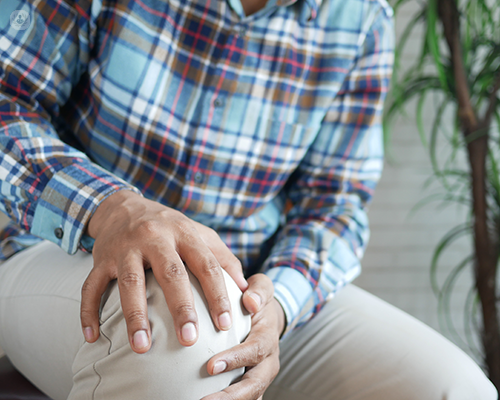The benefits of a Mako® robotic-assisted knee replacement
Written in association with:A Mako® robotic knee replacement is an orthopaedic surgery that utilises a robotic arm system to assist surgeons in performing knee replacement procedures with enhanced precision. This technique can be used for both partial and total knee replacements.
Mr Martin Goddard, renowned consultant orthopaedic knee surgeon, delves into the intricacies of Mako® robotic knee replacement, exploring how it works, its benefits, and what patients can expect from the procedure and the recovery process.

Why might I need a Mako® robotic knee replacement?
A Mako® robotic knee replacement is typically indicated for patients who are experiencing significant knee pain and dysfunction due to degenerative joint diseases or conditions that haven’t responded adequately to conservative treatments.
Specific indications include:
- Osteoarthritis: The most common reason for having knee replacement surgery is osteoarthritis. This condition involves the breakdown of cartilage in the knee joint, leading to pain, swelling, stiffness, and reduced mobility.
- Rheumatoid arthritis: This autoimmune condition causes chronic inflammation of the knee joint, leading to cartilage and bone damage, and significant pain and disability.
- Failure of previous knee surgery: Patients who have had previous knee surgeries, such as partial knee replacements or osteotomies, and continue to experience pain or dysfunction may benefit from a Mako® robotic knee replacement.
How does the Mako® robotic system work?
A Mako® robotic knee replacement is an innovative surgical procedure that offers greater precision, personalised treatment plans, and potentially faster recovery times, making it a promising solution for patients in need of knee replacement surgery.
The process begins with a detailed CT scan of your knee, creating a 3D virtual model. Using this model, your surgeon will then create a detailed surgical plan that outlines the exact dimensions, placement, and alignment of the knee implant. This plan is customised to your unique anatomy, ensuring optimal results.
On the day of the procedure, your surgeon will use the Mako® robotic arm to execute the preoperative plan. The robotic system will provide real-time visual, tactile, and auditory feedback to ensure precise bone cutting and implant positioning.
The robotic arm will assist your surgeon in removing the damaged bone and cartilage from your knee joint, preparing it for the implant. Subsequently, your surgeon will place the knee implant with the assistance of the robotic system, ensuring it aligns perfectly with the preoperative plan.
What is the recovery process like after Mako® robotic knee replacement?
You will typically stay in the hospital for 1 to 3 days, depending on your overall health. During this time, you will receive pain management, wound care, and begin physiotherapy.
Early mobility is encouraged to support your recovery, so you may begin walking with the help of a walker or crutches the day after surgery. Physiotherapists will guide you through exercises to strengthen your knee and improve flexibility.
After being discharged from the hospital, your recovery will continue at home. You will be prescribed pain relief medications to manage any discomfort and prevent infections. Continued rehabilitation is crucial for regaining strength and mobility in the knee, and your physiotherapist will provide you with a tailored exercise plan to support your recovery.
Regular follow-up appointments with your surgeon will ensure your knee is healing properly and the implant is functioning as expected. Most patients will return to their normal daily activities within 6 to 12 weeks, though complete recovery may take several months.
How long does the implant last?
The longevity of a knee implant depends on several factors, including the precision of the surgical procedure and the patient's activity level, weight, and overall health. On average, knee implants can last 15 to 20 years. The enhanced accuracy of the Mako® system will help contribute to a longer lifespan for the implant by ensuring optimal placement and reducing uneven wear.


